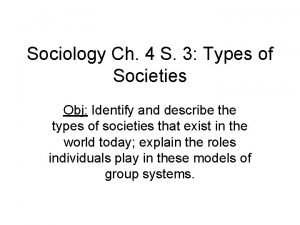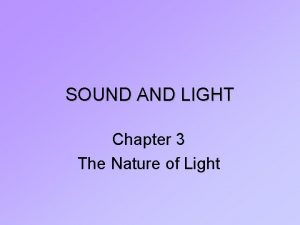Human Societies 3 primary types of societies Hunter







- Slides: 7

Human Societies 3 primary types of societies • Hunter Gatherer Societies • Agricultural Societies • Industrial Societies

Hunter-Gatherer Societies • A society in which people gather natural food, hunt, and are nomadic. • Do not settle in one place • Most have been destroyed or are threatened by modern civilizations. • Low population density • Live with the ability of the land able to sustain it

Agricultural Societies • A society in which crops are grown and people have specialized roles. • Two major changes – People settled permanently – Work was divided among members of society • Increased populations caused more environmental damage. • Higher stress placed on soils and water.

Industrial Societies • A society in which the production of food and other products is performed by machines, demanding large amounts of energy and resources. • High demand for energy and natural resources. • Highest population density among three societies • Severe environmental damage from population density, energy use, and production by industrial society.

Resource Usage Ethics • Frontier Ethic - based on the view that humans are separate from nature – Three rules • Resources are unlimited and meant for human consumption FALSE • Humans are separate from nature and do not obey natural laws FALSE • Human success is measured in terms of control over the natural world. Defined differently by each person, thus a matter of ethics.

Resource Usage Ethics • Sustainable Development Ethic – An ethic that meets the current needs of society without limiting the ability of future generations to meet their needs. • Resources are limited and are not all meant for human consumption • Humans are part of nature and obey laws of nature. • Human success is living in harmony with the natural world • Ethic ensures future for humans is a pleasant one

Resources • Renewable Resources – a resource that regenerates quickly. Ex: wood, animals, plants • Non-renewable Resource – a resource that does not regenerate quickly. Ex: fossil fuels, minerals • Industrial societies are based on non-renewable resources.













